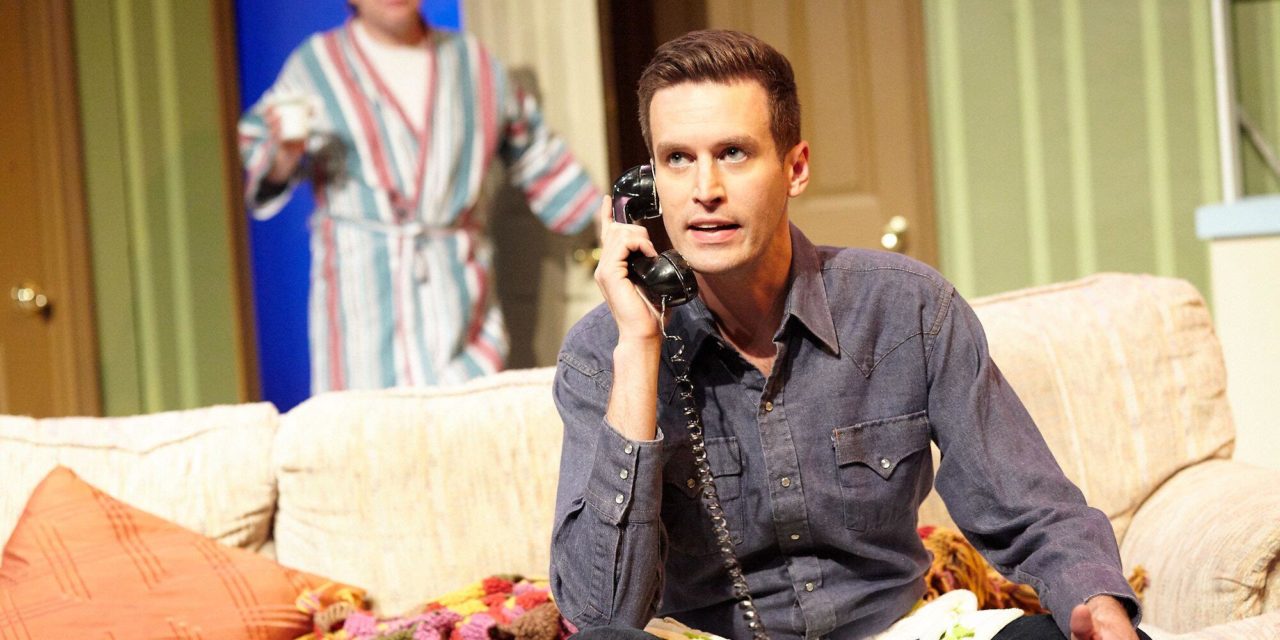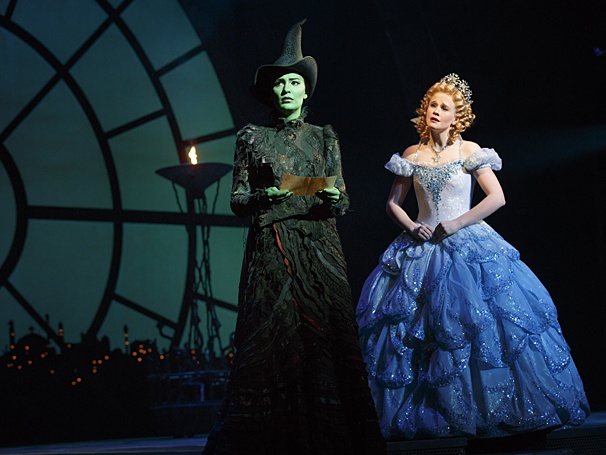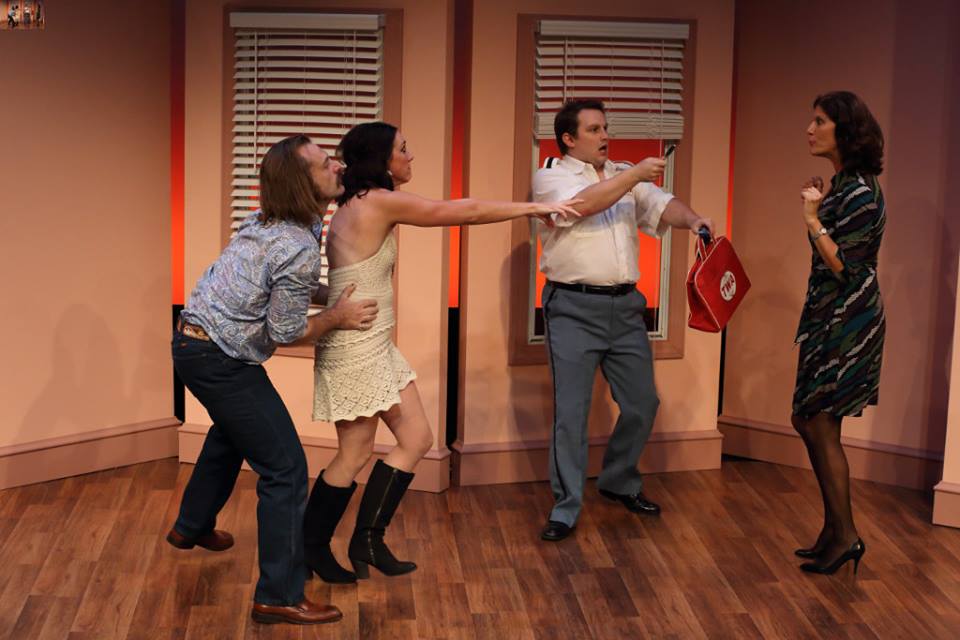Robbie Smith (background) & Jacob Cooper. Photo: Bill Brymer
Torch Song
By Harvey Fierstein
Directed by Seth Lieber
A review by Keith Waits
Entire contents are copyright, © 2019 by Keith Waits. All rights reserved.
When Harvey Fierstein dropped this story on the world in1981 as Torch Song Trilogy, it ran more than four hours. It was a seminal work in LGBTQA+ theatre, a frighteningly intimate story contained within an epic timeframe.
Two years ago Fierstein unveiled a new version stripped down to a far less daunting length of around 2 hours and 30 minutes entitled simply Torch Song. Surprisingly, it removes the torch songs and many of the scenes from the first third of the story, in which the character of Arnold (Robbie Smith) is fleshed out in greater detail and the environments of the club where he is a Drag Queen and the dark back rooms of NYC gay bars where Arnold anxiously meets Ben (Jacob Cooper).
The changes work because it requires far less effort to establish those elements now. Far too many Gay men were hiding their true selves 35 years ago, and there is a much greater awareness of a culture that has come out of the shadows.
As the play moves more rapidly into the relationship with Ben, a bisexual man who remains in the closet, Arnold seems less tentative now. Ben eventually marries Laurel (Melinda Beck) and Arnold falls in love with a younger man, Alan (Ben Gierhart) who works as a model. She invites Arnold and Alan to spend the weekend with her and Ben at Ben’s farm, and one of Fierstein’s great inspirations is to write the entire weekend staged in bed, the four characters moving around one giant bed as a stage-within-the stage. That the sequence seems largely unchanged is something for which we can be grateful, because it remains the brilliant centerpiece of the play.
Act two introduces David (Roman Tate), a gay teenager living with Arnold in foster care under application for adoption. Ben is crashing on the couch because his marriage is in trouble, and Arnold’s domineering mother (Karole Spangler) is due any moment. These latter scenes are more traditional; the archetypal Jewish mother interfering with her son’s life and the dynamic between Arnold and Ben can feel like the unwinding of a romantic comedy, but Fierstein works these tropes with fresh detail and deft structure that builds on the more innovative establishing scenes.
Arnold’s plea is to simply not be viewed as a freakshow but to be allowed to build a home and family on his own terms. Fierstein’s update takes into account the changes in the culture in the forty years since he first launched this loosely autobiographical work, giving credit to a more educated and aware audience that can fill in the gaps where before he needed to spell it out.
Seth Lieber helps a well-chosen cast navigate the play with an eye towards keeping those narrative threads connecting properly. As Arnold, Robbie Smith is a little arch and self-aware in the opening scenes, but he quickly demonstrates a depth of feeling for the character that grounds everything that follows in a palpable reality. His Arnold will break your heart.
Jacob Cooper is a little stiff as Ben, but that feels right for a person who is struggling to reconcile conflicting parts of his identity, and he realizes the innate decency of the character.
Alan appears less in this version, only onstage in the extended bed scene, but Ben Gierhart is charismatic and makes an impression. The same is true for Melinda Beck’s Laurel. Beck gives off a sweetheart glow but also a resolute foundation. Both of the actors handle the intimacy of the scene with confidence.
Roman Tate is a sharp-tongued delight as the precocious David, a character whose self-confidence outstrips everyone else, and Karole Spangler works the Jewish Mother archetype for all it is worth and then mines well below it to make Mrs. Beckoff rise above cliché.
The design work is apt and understated in realizing the period, with costumes by Susan Toy and especially nice sound design from Laura Ellis. Corie Caudill’s second act set is also effectively realized, even if she cannot quite overcome the first act’s necessary dominant beds. In the early scenes, they seem obtrusive until we get to that masterpiece four-character interaction, but I don’t know what could be done outside of inserting an extra intermission to accommodate the scene change, and those beds are ESSENTIAL to this play.
If the original used torch songs onstage metaphorically as a part of the staging, the revision doesn’t abandon that relationship but lets it settle into the background a little bit. By updating his play Harvey Fierstein has given us a glimpse into how American theatre has changed over the last 40 years, an assessment that recognizes that this story remains relevant by reframing it for a new sensibility and a new awareness.
Torch Song
September 13 – 28, 2019
Pandora Productions
At The Henry Clay Theatre
604 South Third Street
Louisville, KY 40202
For tickets go to: Pandoraproductions.org
Keith Waits is a native of Louisville who works at Louisville Visual Art during the days, including being the host of LVA’s Artebella On The Radio on WXOX 97.1 FM / ARTxFM.com, but spends most of his evenings indulging his taste for theatre, music and visual arts. His work has appeared in LEO Weekly, Pure Uncut Candy, TheatreLouisville, and Louisville Mojo. He is now Managing Editor for Arts-Louisville.com.





